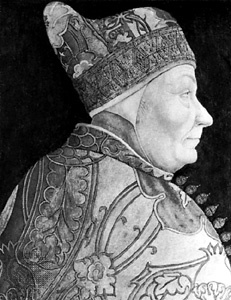Foscari, Francesco
doge of Venice
born c. 1373
died Oct. 31/, Nov. 1, 1457, Venice 【Italy】
 doge of Venice who led the city in a long and ruinous series of wars against Milan. His life story is the subject of the tragedy The Two Foscari by Lord Byron and of an opera by Giuseppe Verdi.
doge of Venice who led the city in a long and ruinous series of wars against Milan. His life story is the subject of the tragedy The Two Foscari by Lord Byron and of an opera by Giuseppe Verdi.Belonging to a prominent Venetian family, Foscari headed the Council of Forty (1401) and the Council of Ten (1405–13), Venice's ruling bodies, during the city's wars for territorial expansion. Soon after his election as doge in 1423, he made an alliance with Florence and began a war against the duke of Milan, Filippo Maria Visconti. The Venetians won Brescia in 1426, and a peace was reached in 1427. War resumed in 1431, and the subsequent Peace of Ferrara (1433) failed to settle the balance of power. A war with Bologna ended in a treaty in 1441 that increased Venetian territory, to which Ravenna was added shortly thereafter.
In 1443 he resumed the war with Milan. Even after Filippo Maria died, Foscari pursued the war. The greater part of northern Italy was ravaged, and no member of its complex system of alliances emerged as a clear victor. Finally, in 1454 the Peace of Lodi ended the hostilities, and the Italian League, including Venice, Florence, and Milan, was formed.
In the meantime, Constantinople had fallen to the Turks (1453). His attention on his Italian wars, Foscari had failed to prevent losses of Venice's eastern territory to the Turks.
After such blows to Venice's trade with the Orient, Foscari's enemies sought to depose him. They accused him, probably unjustly, of the murder of the Venetian admiral Piero Loredan. This accusation, together with the banishment of his son for suspected treason, forced Foscari's resignation on the formal demand of the Council of Ten (Oct. 23, 1457). Eight days later he was dead.
- Vereeniging, Peace of
- Vere Family
- Vereshchagin, Vasily Vasilyevich
- Verethraghna
- Verga, Giovanni
- Vergennes, Charles Gravier, comte de
- Vergerio, Pietro Paolo
- Vergerio, Pietro Paulo
- Verghina
- Vergil, Polydore
- Verginius Rufus, Lucius
- Vergniaud, Pierre-Victurnien
- Vergílio Ferreira
- Verhaeren, Émile
- verifiability principle
- verisimilitude
- verismo
- Verkhoyansk
- Verkhoyansk Mountains
- Verlaine, Paul
- Vermeer, Johannes
- Frank Heyling Furness
- Frank Hyneman Knight
- Frank I. Cobb
- Frankie, and the Teenagers Lymon